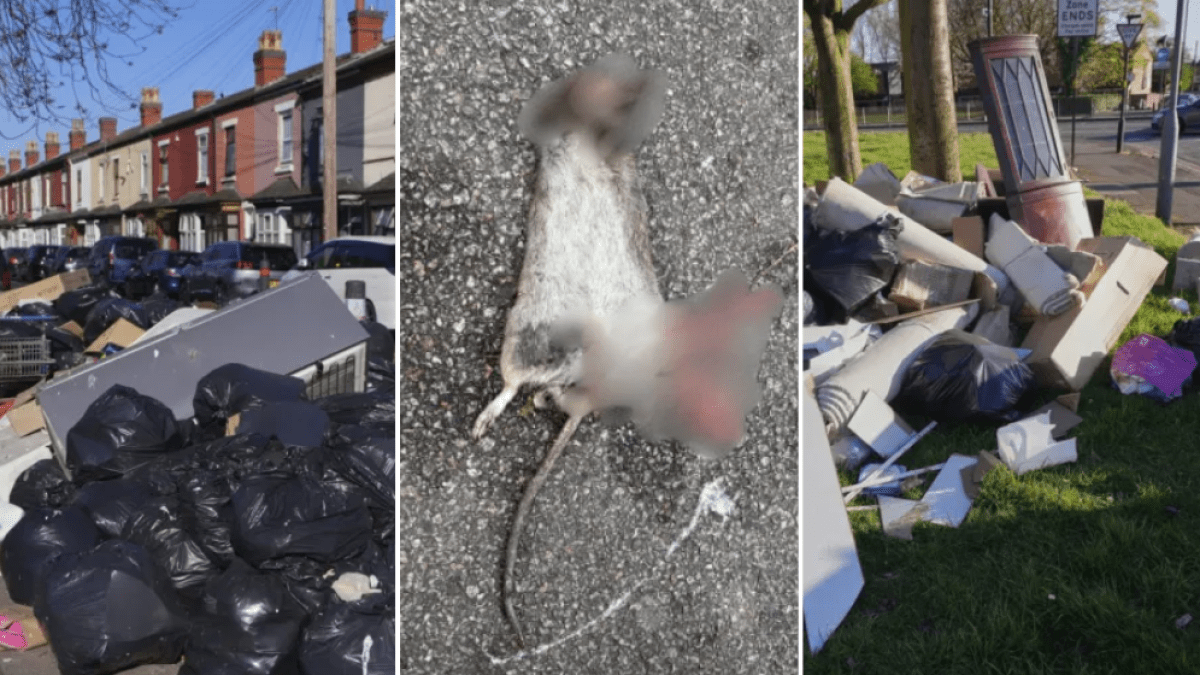Toys, trolleys and fruit machines have been dumped in the city’s streets as the bin strike continues
Birmingham is set to be “inundated” by a fresh generation of rat babies, a pest control expert has warned as the ongoing bin strike intensifies.
Black bin bags line the city’s streets, along with more unusual household items dumped by fly-tippers, including fruit machines, cat scratching posts, toys and carpets.
Sofas, fridges, trolleys, mattresses, cabinets, and even car parts have also been dumped in residential areas, amid reports that the chaos is over-spilling into surrounding neighbourhoods outside Birmingham City Council’s control.
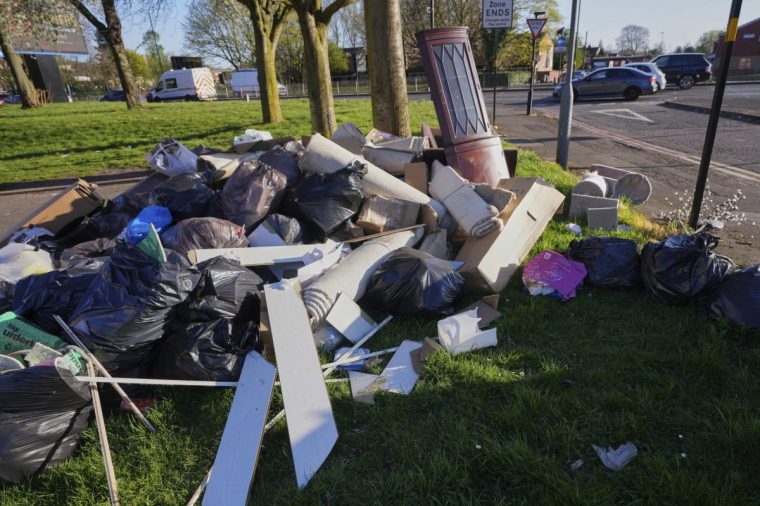 Rubbish piles up on a street in Birmingham during the workers’ strike (Photo: Kirsty Wigglesworth/AP Photo)
Rubbish piles up on a street in Birmingham during the workers’ strike (Photo: Kirsty Wigglesworth/AP Photo)
Members of the Unite union went out on strike on Tuesday 11 March, due to a long-running dispute over the role of waste recycling and collection officer (WRCO) being removed.
The union claims the move will leave about 150 members £8,000 worse off. One bin worker told The i Paper that she would be made homeless if the union’s demands are not met.
Residents in Birmingham have reported “rats as big as cats” roaming their streets.
Pest controller Will Timms previously told The i Paper he has seen 22in-long rats, which are thriving as a result of the strike.
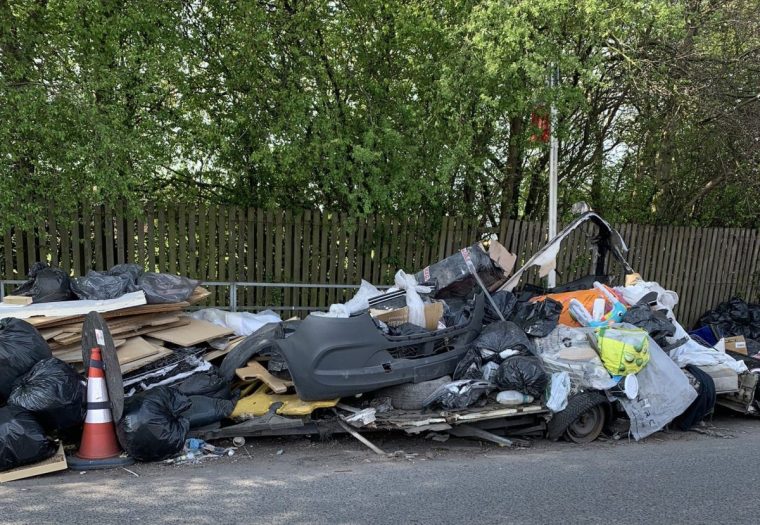 Rubbish in the street outside Ward End Park, Birmingham (Photo: PA Wire)
Rubbish in the street outside Ward End Park, Birmingham (Photo: PA Wire) 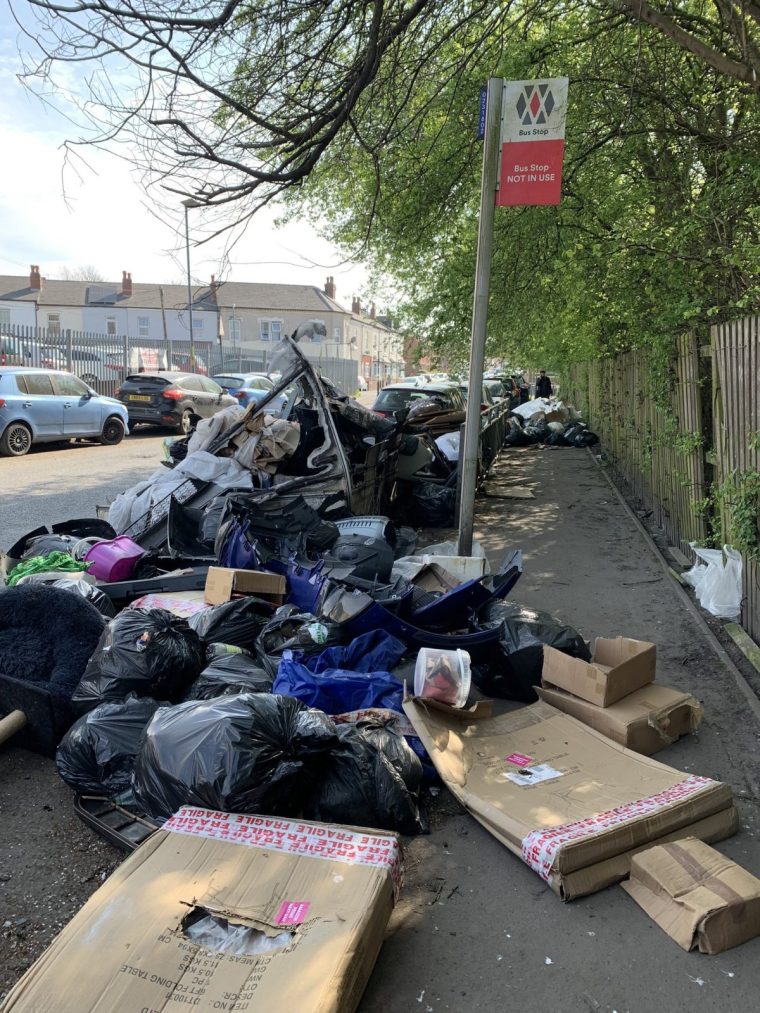 Birmingham residents say they have had to think outside the box amid the bin strike as getting a slot at a tip is like ‘winning a lottery’ (Photo: PA Wire)
Birmingham residents say they have had to think outside the box amid the bin strike as getting a slot at a tip is like ‘winning a lottery’ (Photo: PA Wire)
Rat populations can grow extremely quickly – the rodents become sexually mature at two months old and give birth every three weeks to between six and 12 babies.
Timms added that it is a perfect habitat for the rats to breed – and seeing as they give birth every three weeks, Birmingham residents are set to be “absolutely inundated” by rats over the coming days.
Health Secretary Wes Streeting expressed concern about the public health situation.
“As the bin bags are piling up, we see rats and other vermin crawling around,” he told Times Radio. “That’s not good for public health. I think this dispute has escalated way out of hand.”
He said it is “totally unacceptable” that the dispute has seen bin lorries blocked from leaving the depot.
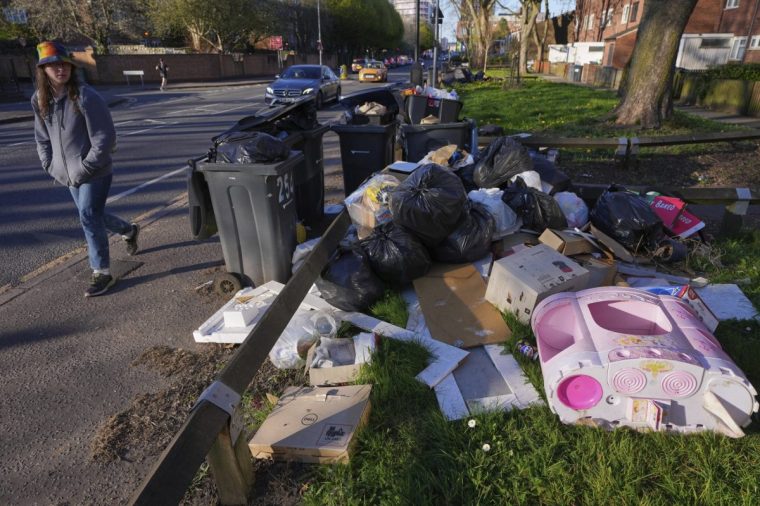 Rubbish piles up on a residential street in Birmingham (Photo: Kirsty Wigglesworth/AP Photo)
Rubbish piles up on a residential street in Birmingham (Photo: Kirsty Wigglesworth/AP Photo)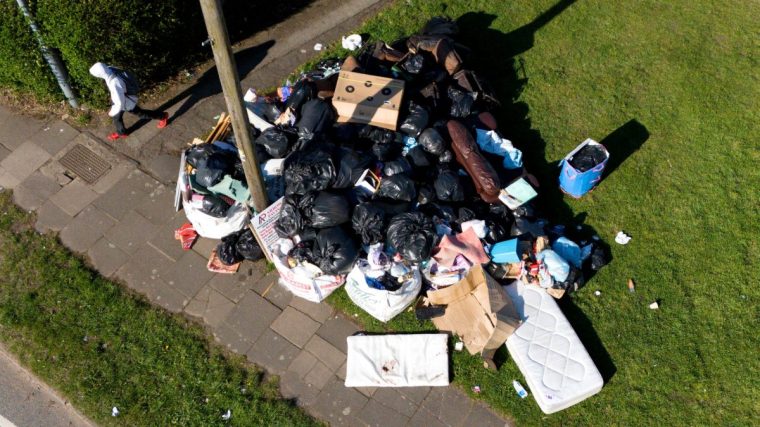 Furniture and uncollected refuse bags in Yardley, east Birmingham (Photo: Jacob King/PA Wire)
Furniture and uncollected refuse bags in Yardley, east Birmingham (Photo: Jacob King/PA Wire)
“I understand industrial disputes happen. I understand people have the right to withdraw their labour. That’s part and parcel of industrial relations in our country. But what is not acceptable is allowing these sorts of unsanitary conditions to occur on people’s streets,” Streeting added.
The city council declared a major incident on 31 March because of the impact and talks between local government and Unite are continuing in an effort to break the deadlock.
Talks on Tuesday between the city council and Unite the Union aimed at resolving an all-out strike by refuse collectors ended with “no resolution” a Unite spokesperson told Sky News.
A Birmingham City Council spokesperson said: “The talks with Unite were productive, but there are still a number of issues to resolve. We are looking forward to continuing with negotiations.”
Local Government Secretary Angela Rayner met council leader John Cotton at the weekend.
The Fire Brigades Union (FBU) has offered its support to the strikers and said its members will not step in to help clear rubbish.
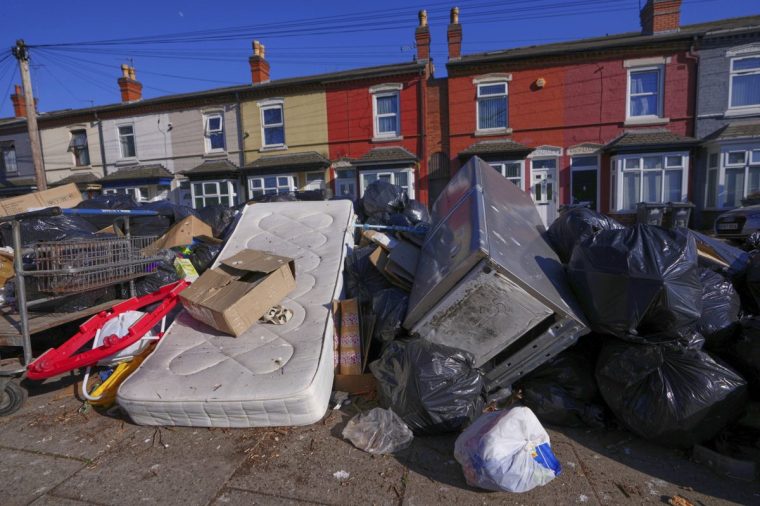 Rubbish piles up on a residential street in Birmingham (Photo: Kirsty Wigglesworth/AP)
Rubbish piles up on a residential street in Birmingham (Photo: Kirsty Wigglesworth/AP)
The daily rate of uncollected waste accumulation in Birmingham has risen from 483 tonnes per day in the week commencing 10 March to 655 a day the following week, to almost 900 in the week of 24 March.
Refuse collection teams normally make over half a million collections a week.
Long queues have been building up outside mobile bin collection points in the city, and household recycling centres have extended their hours.
Birmingham City Council’s website says that residents should continue to put their household waste out on their normal collection day, but recycling collections are suspended so those bins should not be put out.
The council has said it has made a “very fair offer” to Unite, and that it hopes bin collections will be back to normal “as soon as possible,” but talks with the union have not yet been successful.
A timeline of the Birmingham bin strikes
6 January: Refuse workers represented by the Unite union go on strike over a long-running dispute over the role of waste recycling and collection officer (WRCO) being removed.
3 February: The industrial action is initially supposed to last for 12 days over four months, but Unite announces that it will be intensified, with 12 days taking place in February.
26 February: A further escalation is announced.
11 March: 350 refuse workers begin an indefinite, all-out strike.
27 March: Talks collapse between Birmingham City Council and Unite, with the local authority threatening compulsory redundancy for those who have “declined all offers on the table”.
31 March: Birmingham City Council declares a major incident, saying that this is in response to a risk to public health and of damage to the environment.
It says that picket lines blocking depots have been stopping vehicles from exiting, meaning that 17,000 tonnes of rubbish has been left uncollected.
Declaring a major incident enables the council to deploy an extra 35 vehicles and crews to collect rubbish.
2 April: The bin strike is referenced during Prime Minister’s Questions, with Sir Keir Starmer saying that the Government will provide any support necessary to the council.
3 April: Unite general secretary Sharon Graham writes to Deputy Prime Minister Angela Rayner to accuse ministers of sitting on their hands.
5 April: Rayner meets Birmingham council leaders.
